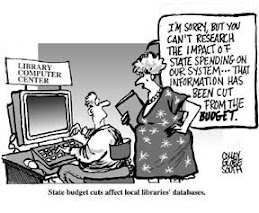Friday, October 23, 2009
Academic libraries, not just public libraries, being affected by the economy
This article made me wonder how many other academic libraries are facing budget concerns. Will more and more libraries have to make decisions similar to those made by the University of California Berkeley? If so, how will these decisions impact students and faculty who depend on the libraries for study, research, and resources? Budget problems could result in cuts other than just reduced hours. For example, maybe an academic library will have to reduce the number of databases it subscribes to. Overall, budget cuts could potentially cause major changes at academic libraries. Librarians and patrons alike will have to deal with the changes.
The University of California Berkeley was able to recover from the cuts it made, largely due to very generous donations. However, not all academic libraries will be able to find donors to give large sums of money. The University of California Berkeley is a very prominent school so it was able to get donations. I do not think the library of a small college with less exposure, for example, would be able to get the same kinds of donations. Thus, many academic libraries will have to find different solutions or be forced to cope with budget cuts and their affects.
Sunday, October 18, 2009
When Places of Refuge Need Help


What does this mean?
Without the certification, “libraries would not be eligible for the state grants that round out local library budgets, and their residents would be deprived of the ability to borrow from most other public libraries.” Without the ability to make interlibrary loans, each public library would become its own entity. The problem with this is that libraries are mean to serve the public, and this is best achieved through pooling mass resources like books, audios, and videos.
14 out of 348 local libraries in Massachusetts have lost their certification.
How could such a thing happen?
“To be certified, communities must meet multiple standards, including a requirement that they increase library budgets each year by 2.5 percent, compared with the average spent in the three previous years.” In today’s economy these standards seem strict and impossible. How can a library be expected to increase its budget when each year it is cut?
Saturday, October 17, 2009
Troy: Say It Ain't So!
The city of Troy is going through a major overhaul trying to figure out how to keep many community buildings open to the public. Due to the lack of property tax revenue, a projected 10.5 million dollar loss over the next five years may cause the city to close its libraries, museums, and community centers. City Manager John Szerlag said the city would have to cut 67 police department jobs to keep open the libraries, museums, and community centers, stating that Troy “can no longer economically sustain our organization”. The city leaders met on September 28th to discuss the city’s options for dealing with this dilemma and three proposals have emerged:
1. The city could close the library, community center, museum, and nature center. Under this plan, the city would also cut back on police and fire by 25% and privatize some departments.
2. The library, community center and museum would stay open on a limited basis, but the city would lay off other employees, including police.
3. City Manager John Szerlag proposed a two million dollar operating levy that would keep the public safety services intact and fund the library, nature center and museum. That would equate to about $103 on the average residential tax bill, according to the Detroit News.
Whatever plan the city of Troy decides to follow in this budgetary crisis, I hope it includes finding a way to keep the public library and other services open to the community.
Saturday, October 10, 2009
Patron Lifelines

I saw this sign in the Bloomfield Township Public Library the other day. I think it’s great that local libraries are staying current with the needs of their patrons and providing services that reflect their needs. This sign shows that the library is promoting important programs and resources that are available for patrons that they might not have known about. This is a great PR move to help keep the library current in times when many think it is an outdated resource. My only question is who is going to create a life line for the sinking libraries?
Wednesday, October 7, 2009
The worst situation libraries find themselves concerning the economy involves lack of information about the situation, which ultimately leads to less concern about libraries as a whole. It's a fact that lack of awareness pushes libraries into the foreground of those establishments that experience severe budget cuts. In Michigan alone, library budgets are being cut by nearly half, from 10 million dollars to 6 million dollars. If we are the ones who want to establish careers in libraries and library service, what can we do now that will push for a more stable financial situation in the future? When we became students of the Library and Information Sciences program we took on a responsibility to the field that will be with us for the rest of our lives. In light of that, we are a part of the professional community, and we do have an influence. As "The Nextgen Librarian's Survival Guide" so aptly sums it up, "we have the chance to impact a changing institution and a changing profession, and to build the experiences we need to lead our libraries in the future".




